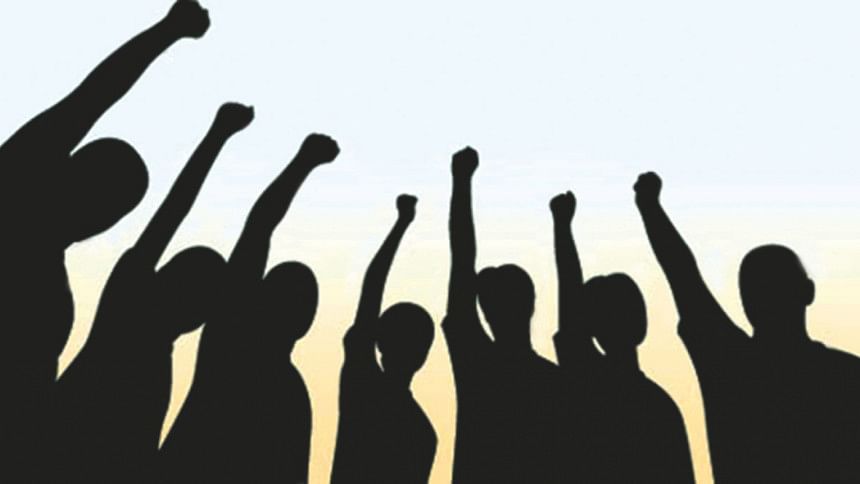UNLOCKING THE YOUTH POTENTIAL

On December 17 1999, the UN General Assembly endorsed the recommendation made by the World Conference of Ministers Responsible for Youth that August 12 be declared International Youth Day. Today, on the 15th year of its observance, we wonder about the state of the youth in Bangladesh. Are the young segments of our population living up to their potential? How hopeful are they about the future? Do they believe sky is the limit?
Diogenes, the Greek philosopher, said, "The foundation of every state is the education of its youth." If Diogenes were alive today, he wouldn't be too impressed with the current state of affairs. Ignoring the dismal school and university enrollment rates countrywide among other factors, a simple look at the most recent HSC results gives one a glimpse into the declining state of the education system. In the eight general education board, a total of 65.84 percent of students passed the HSC. This is the lowest figure since 2008. Coupled with the political upheaval early this year -- non-stop oborodh and hartal led by the BNP and its 20 party alliance -- and allegations of question paper leaks, students nationwide were among the worst hit, as their academic lives bore the ultimate catastrophic consequences. The VAT of 7.5 percent slapped upon private universities added insult to injury (especially when you take into consideration the fact that education and the cost of living in Bangladesh is disproportionately higher than developed countries). Growing dissatisfaction and pessimism among students is rampant, and their pleas continue to be ignored.
One of the most toxic traits of the education system in today's Bangladesh -- and it has been said countless times before -- is the extent to which it has been politicised. Higher education, bureaucracies, corporations are all politicised to some extent in democracies, but in Bangladesh, it has been so deeply embedded over time that it's impossible to discuss the impediments to an effective education system without touching on the festering wound that is student politics.
It's a shame that student politics in Bangladesh today, manifesting itself as a strict patron-client relationship, has become synonymous with corruption, violence and everything evil, given the country's historical relationship with student demonstrations that planted the seeds of independence in 1971 and helped foster the nation's self-identity. In the present day, this institutionalised form of discrimination of students based on party affiliations endorsed by both political parties is a major hurdle for current and prospective students who simply want an education without getting involved in the messy, dirty business of politics.
Whereas student movements in the foregone days lent the youth a voice to be collectively heard and rally under a common banner, politically opposed youngsters and footsoldiers of the main political parties -- lured by the trappings of being involved in student youth wings -- are now too busy killing one another to engage in activism for the common good. Unlike in the 60s when a secular spirit brought together the youth to stand up against exploitation and other forms of injustice, much of student political activism today tends to verge on the extreme. Given the dangerous lack of space in civic society allotted to youth voices and their political underrepresentation, the forces of radicalisation have never loomed larger and the threat of militancy increases by the day. The overall culture of violent politics -- legitimised through decades -- is a major stumbling block in the way of tapping the potential of Bangladesh's window of opportunity that is its demographic dividend.
The education system, as it stands now, is heavily skewed in favour of the politically affiliated and the privileged. There is an urgent need for the reversal of the patron-client relationship deep-seated in student politics in Bangladesh today. The educational environment is one that's supposed to foster political consciousness among the youth and empower them to stand for the change they believe in -- and not function as an extension of the major political parties and work as their mouthpiece. Corrupt student politics reigning our educational institutions is further tipping the scales in favour of those who already have easy access to educational means.
The abominable state of child rights in Bangladesh is yet another indicator of the country failing its youth miserably, and one that signals a bleak future for posterity. In light of the recent inhumane murders of Rajon and Rakib that have rocked the nation's conscience to the core, national conversations about child rights have once again been thrown into the limelight, albeit temporarily, I'm sure. It is a travesty that unless incidents of child abuse are recorded on video and shared on social media, the nation, including the higher-ups, turns a blind eye to their plight. The new lows of human depravity that we seem to be succumbing to day by day, in terms of violating child rights, are hardly surprising in a country where lowering girls' marriageable age is state-sanctioned and child labour occurs in plain view.
On the brighter side, Bangladesh is seeing a growing number of youngsters with a strong sense of responsibility and community awareness. Be it resisting illegal levies, providing schooling for underprivileged children, or fighting for indigenous rights and women's rights, it's primarily the youth who are at the forefront of movements and organisations trying to make a difference. Despite the lack of transparency in private and public bodies, youngsters are unstoppable in their bid to challenge the status quo with democratic tools. These young men and women, who strive for a more just society everyday, are a role model for upcoming generations when it comes to civic engagement and being positive agents of change. In a country where resorting to violent means seems to be the norm, the fact that youth leaders and activists are using peaceful avenues to demand change is a rare sign of hope.
The focus of this International Youth Day is on civic management, and the latter no doubt greatly hinges upon economic opportunities and engagement of the youth. In this regard, the government must set its eyes on prioritising pathways to affordable, accessible education and show true commitment towards protecting child rights -- the state of both of which is in a shambles. One cannot talk about authentic civic engagement without speaking up against the woes of child rights violations and unequal opportunities to education and other resources. But in order to do that, we must first recognise and acknowledge the innovative and diverse roles that the youth can play and the promise that they hold for the future.
The writer is a journalist at The Daily Star.

 For all latest news, follow The Daily Star's Google News channel.
For all latest news, follow The Daily Star's Google News channel. 



Comments